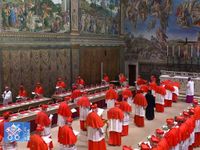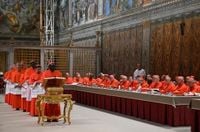On May 7, 2025, a pivotal moment unfolded at the Vatican as the College of Cardinals commenced the historic task of electing the 267th Pope, following the recent passing of Pope Francis. This conclave, held in the iconic Sistine Chapel, marks a significant event not just for the Catholic Church, but for the global community that looks to the Vatican for moral guidance.
The day began with a solemn public Mass at St. Peter's Basilica, after which the 133 cardinals, representing 70 countries, entered the Sistine Chapel to begin the conclave. This gathering is noted for its record number of participants, reflecting Pope Francis's efforts to broaden the Church's reach into remote regions with fewer Catholics. The last conclave in 2013 had only 115 cardinals from 48 countries.
As the cardinals took their oaths of secrecy, they prepared to engage in a process steeped in tradition that dates back to the Middle Ages. During the conclave, they will be isolated from the outside world, prohibited from any communication beyond the chapel's walls. This year, high-tech measures, including jammers to prevent eavesdropping, have been implemented to maintain the confidentiality of the proceedings.
Voting will occur in multiple rounds, with only one ballot scheduled for the first day. However, after the initial vote, the cardinals can cast up to four ballots per day until a candidate secures the necessary two-thirds majority, equating to 89 votes. Black smoke from the chimney will indicate an inconclusive vote, while white smoke and the ringing of bells will signal the election of a new pope.
Leading candidates for the papacy include Cardinal Pietro Parolin of Italy and Cardinal Luis Antonio Tagle of the Philippines, both of whom are seen as frontrunners. Other potential candidates include Cardinal Jean-Marc Aveline of France, Cardinal Peter Erdo of Hungary, Cardinal Robert Prevost of the United States, and Cardinal Pierbattista Pizzaballa of Italy. No candidate stands out as the clear favorite, which adds an element of unpredictability to the election.
As the conclave commenced, prayers were offered from around the world, with the Catholic Church in Thailand and the Philippines leading initiatives to support the cardinals through their spiritual journey. In Thailand, Father John Bosco Suwat Luangsaard stated, "Prayers in both Thai and English have been prepared so that everyone can participate meaningfully in these holy days." Archbishop Francis Xavier Vira Arpondratana emphasized the sacred nature of the election, urging believers to pray for a new shepherd who embodies the heart of Jesus.
In the Philippines, Bishop Ruperto Cruz Santos requested that all parishes hold Masses dedicated to the cardinals' task. He expressed a desire for the Holy Spirit to guide the cardinals in their deliberations, highlighting the importance of this moment for the Church. Bishop Jesse Mercado of Parañaque echoed these sentiments, encouraging Catholics to approach this time with hopeful prayer as they seek a leader who reflects Christ's compassion and courage.
The conclave's significance extends beyond the selection of a new pope; it serves as a moment of reflection for the Catholic Church as it confronts contemporary challenges. The new pope will be tasked with continuing the reforms initiated by Pope Francis, which have sought to address issues such as clerical abuse, social justice, and the Church's role in a rapidly changing world.
Historically, the average duration of conclaves has been just over three days, with none lasting more than five days in recent memory. The conclave in 2013, for example, concluded in just two days. As the cardinals enter this sacred process, the world watches closely, awaiting the announcement of a new pope who will lead the Catholic Church into its next chapter.
The Vatican, steeped in centuries of tradition, has adapted to modernity while maintaining its core values. The conclave's proceedings, shrouded in secrecy and solemnity, highlight the importance of discernment and the role of the Holy Spirit in guiding the Church's future. As the cardinals cast their votes, they do so with the weight of history on their shoulders, knowing that their decision will resonate through generations.
In this sacred moment, the Catholic Church invites the faithful to join in prayer, reflecting on the significance of the papal election and the hope it brings for a united and compassionate Church. As the conclave unfolds, one thing remains clear: the journey to find a new pope is not just a matter of votes, but a profound spiritual undertaking that transcends borders and unites believers worldwide.





